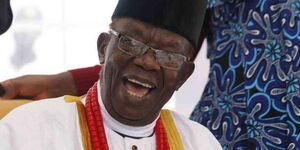President William Ruto's administration will exit the government-to-government oil deal with select Saudi Arabia companies in December this year after admitting that the agreement was creating distortions in the foreign exchange market.
Documents signalling the end of the deal, which was touted as one of Ruto's fiscal policies, were captured in the latest report by the International Monetary Fund (IMF) on Kenya's plan to revive the economy.
Treasury was said to have argued that the controversial G2G deal had flopped as it failed to stabilise the exchange rate in favour of the Kenyan currency.
The G2G deal, introduced in April 2023, was brokered by Kenya’s Ministry of Energy and Saudi Aramco, Abu Dhabi National Oil Corporation Global Trading (ADNOC) and Emirate’s National Oil Company (NOC).
"The government intends to exit the oil import arrangement, as we are aware of the distortions it has created in the foreign exchange (FX) market, the accompanying increase in rollover risk of the private sector financing facilities supporting it and remain committed to the private market solutions in the energy market," the report read in part.
"We commit that all FX (foreign exchange) conversions done as part of the oil scheme will be done at market rates."
The G2G deal replaced the open tendering system that allowed oil marketers to be paid upon five days of delivery. This created unnecessary pressure on the foreign exchange market.
In turn, the Saudi oil deal provided a six-month credit for oil imports. According to the Treasury, the average monthly import volumes failed to attain the monthly minimums agreed under the arrangement.
"This was due to lower demand from our domestic market as well as from the regional reexports markets," the Treasury explained.
"The initial agreement was extended for another twelve months to December 2024 with more favourable costing terms."
The government's move to exit the deal comes after months of President Ruto defending the deal amid criticism over graft claims.
Last year, Ruto promised that the Kenyan currency would stabilise as fuel marketers would purchase products in Shillings and ease pressure on the dollar.
However, nine months later, the Kenyan shilling's official exchange rate hit Ksh161 to the dollar, exceeding the record decline against the US-based currency.
"In fact, in the next month or so, the dollar will come down phenomenally. In my estimation, the exchange rate will come down to Ksh120,” Ruto stated in April 2023.
"The international oil companies sell fuel directly to oil marketers in Kenya. The entire process is private sector-driven,” he added in November last year after former Prime Minister Raila Odinga claimed that the deal was signed to help Kenyan Companies, Gulf Energy, Galana Oil Kenya Ltd, and Oryx Energies Kenya Limited, evade taxes.
"It (the deal) is shrouded in deep secrecy. To date, only two documents have been made public; that is the Master Framework Agreement with petroleum trading entities and the Open Tender System modified agreement with marketers," Raila warned.
''Nobody knows how Gulf Energy, Galana Oil Kenya Ltd, and Oryx Energies Kenya Limited got nominated to handle local logistics. But the hand-picked distributors are selling oil to us at almost twice the price from bulk suppliers,'' he added.












